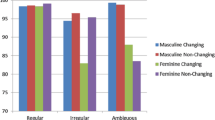Abstract
Two experiments were conducted on college students (combinedN=240) to test for the effect of sentence predication on the independent judgement of word significance. Students judge which of two nouns was personally more significant to them. They also employed these nouns in a task which required them to place one word in the subject location and the other in the predicate location of an incomplete sentence. Administration order of these two experimental tasks was counterbalanced. Experiment I demonstrated that when the sentence-completion task is taken first-in which a predication is necessarily framed between the two nouns-the student will subsequently be more likely to judge the noun placed in the subject location of the sentence as more significant than its counterpart (p<.025). Experiment II provided a cross-validation of these findings and also demonstrated that the location of the more significant noun in the sentence can vary between subject and object location depending on whether the verb relation in the sentence unites the two nouns positively or negatively (p<.001).
Similar content being viewed by others
References
Anderson, R. C., & Ortony, A. (1975). On putting apples into bottles—a problem of polysemy.Cognitive Psychology, 7, 167–180.
Aristotle. (1952).Categories. In R. M. Hutchins, (Ed.),Great books of the western world (Vol. 8, pp. 5–21). Chicago: Encyclopedia Brittanica.
Bobrow, S. A., & Bower, G. H. (1969). Comprehension and recall of sentences.Journal of Experimental Psychology, 80, 455–461.
Bower, G. H. (1975). Cognitive psychology: An introduction. In W. K. Estes (Ed.),Handbook of learning and cognitive processes (pp. 25–80). Hillsdale, NJ: Erlbaum.
Braine, M. D. S. (1976). Children's first word combinations.Monographs of the Society for Research in Child Development,41, (Serial No. 164, Issue No. 1).
Bugaj, A. M., & Rychlak, J. F. (1989). Predicational versus mediational modeling and the directedness of cognition in impression formation.The Journal of Mind and Behavior, 10, 135–199.
Cermak, L. S. (1976).Improving your memory. New York: McGraw-Hill.
Estes, W. K. (1982). Learning, memory and intelligence. In R. J. Sternberg (Ed.),Handbook of human intelligence (pp. 170–224). Cambridge, UK: Cambridge University Press.
Plato. (1952).Sophist. In R. M. Hutchins (Ed.),Great books of the western world (Vol. 7, pp. 551–579). Chicago: Encyclopedia Britannica.
Rock, I. (1957). The role of repetition in associative learning.American Journal of Psychology, 70, 186–193.
Rock, I., & Heimer, W. (1959). Further evidence of one-trial associative learning.American Journal of Psychology, 72, 1–16.
Rundus, D. (1971). An analysis of rehearsal processes in free recall.Journal of Experimental Psychology, 89, 63–77.
Rychlak, J. F. (1988). Predicational versus mediational theorizing in psychology. In W. Baker, L. Mos, H. Rappard, & H. Stam (Eds.),Recent trends in theoretical psychology (pp. 117–126). New York: Springer-Verlag.
Rychlak, J. F. (1990). George Kelly and the concept of construction.International Journal of Personal Construct Psychology, 3, 7–19.
Rychlak, J. F. (1991).Artificial intelligence and human reason: A teleological critique. New York: Columbia University Press.
Rychlak, J. F., Barnard, S., Williams, R. N., & Wollman, N. (1989). The recognition and cognitive utilization of oppositionality.Journal of Psycholinguistic Research, 10, 135–152.
Thorndike, E. L., & Lorge, I. (1944).The teacher's word book of 30,000 words. New York: Bureau of Publications, Teachers College, Columbia University.
Ultan, R. (1969). Some general characteristics of interrogative systems.Working Papers in Language Universals (Stanford University),1, 41–63.
Yartz, F. J. (1984).Ancient Greek philosophy: Sourcebook and perspective. Jefferson, NC: MacFarland & Co.
Author information
Authors and Affiliations
Rights and permissions
About this article
Cite this article
Rychlak, J.F., Rychlak, L.S. Evidence for a predication effect in deciding on the personal significance of abstract word meanings. J Psycholinguist Res 20, 403–418 (1991). https://doi.org/10.1007/BF01067972
Accepted:
Issue Date:
DOI: https://doi.org/10.1007/BF01067972




